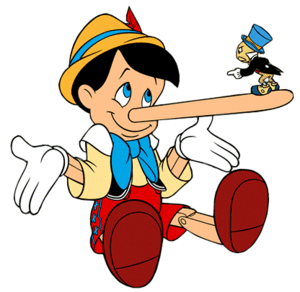Why do we lie?

source: Barry Schwartz (labeled for resuse)
“Why did you lie to me?” We hear that often. I’ve said that, and I’ve been asked that same question. Well, why do we lie? We lie because we can’t control the impulse to do so. In fact, studies show that children as young as six months old can lie, such as fake crying for attention. Lying often becomes an everyday habit, a common human flaw, and to some, a necessity. We lie to protect ourselves, as well as others we care about. It becomes a partly subconscious defense mechanism, in order to prevent us from getting hurt. In the process of lying, however, we can affect those around us and, ironically, might end up hurting ourselves even more.
Lying in sports is common. For example, the case of ace Little League pitcher Danny Almonte from the Bronx. Coach Rolando Paulino led Danny’s team to third place in the Little League World Series on 2001 when coaches from the opposing teams became suspicious of Danny’s age. Apparently, the player’s father had made him a fake birth certificate and the boy was actually older than 12—the maximum age allowed in the tournament. Because of this, Danny’s team ended up being disqualified from the League, and his father was sent to jail.
Why did Danny lie? Maybe he lied because he wanted to continue playing on a team in which he felt comfortable; maybe he did it for his friends, who might have needed his participation in the team. The consequences in this case brought about confusion as to who was to blame for the deception that led to the disqualification. Coaches? Parents? The boy? Whatever the answer is, he lied because it was an impulse. We are often controlled by our impulses, leading us to do things without really thinking through them ahead of time.
When we tell a lie, many of us often think about protecting ourselves. For example, some of us are willing to make a fake ID so that we can pass off as older in order to enter a nightclub. Is that really a problem if so many people do it? What are the consequences? That’s the problem. We don’t weigh the consequences because we are too caught up in our lies. It’s comical how some people, despite knowing they’re too young to be at a nightclub, get angry at the security guards for not letting them in, who are just doing their jobs. Lies are usually focused on the present, not on the future. Therefore, until it actually hits us, the consequence of our lies won’t matter, at least not to all people. It’s difficult to ask someone the reason for lying after the lie has been uncovered, because the motivation doesn’t matter after it has already been told. What really matters is what will come from the lie.
We also feel the impulse to lie so that the truth doesn’t hurt us. For example, in seventh grade one of my friends did not want to get punished for not finishing a paper, so she lied about losing the file on Word. In the process of not wanting to get hurt, she ended up getting caught, which hurt her even more and left her in a state of confusion. She kept asking herself why she had to lie about her paper, but it was already too late. Instead of moving forward, she ended up regressing to the source of the conflict. The problem with lying is that it becomes a vicious cycle that ends up hurting more.
In the end, we lie because we can’t handle the truth, be it about others or ourselves. A lie, however little it may seem, will most likely reverberate into greater lies. We are more scared to tell the truth about a certain situation than we are scared of lying and potentially hurting ourselves even more. We lie because we are empty of clear judgment when faced with adversity. We find ourselves in that sickened stage, when there are so many options to deal with a problem that there seems to be no other solution but to lie. As Mark Twain cleverly stated, “we are never more truthful than when acknowledging ourselves as liars.” After all, at the same time that we don’t weigh the negative consequences, we expect that perhaps the lie will pay off. We wouldn’t exist without our lies, and some people even choose to live their lives buried within lies. Ultimately, we lie because there is a chance we might not get caught, as morally dubious as that is.
Sources: psychologytoday.com; amazonaws.com; espn.go.com

Julia has been a part of The Talon for three years, as a POV columnist and Features reporter. She enjoys singing and, of course, writing. Her POV section...





